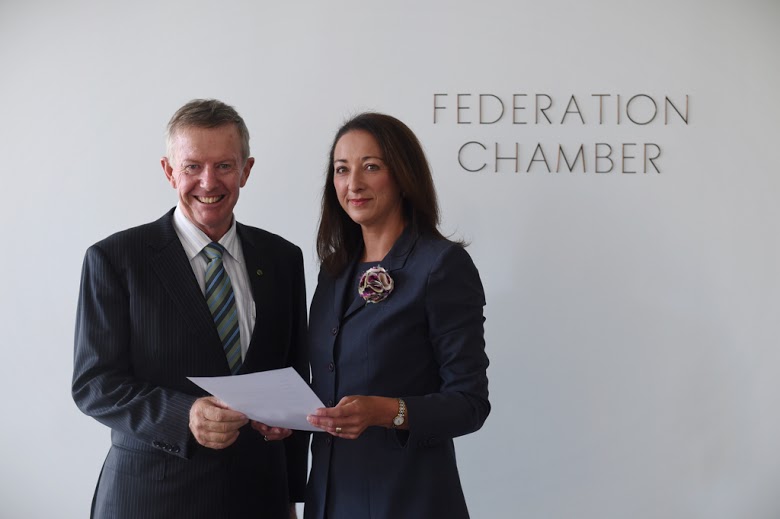
A motion calling for an end to the persecution of Baha’is in Iran won bipartisan support in the Australian House of Representatives yesterday.
The motion comes in the same week that Iran will appear before the UN Human Rights Council in Geneva to address its human rights record.
Moved by the Member for Canberra, Gai Brodtmann MP, the motion was seconded by the Member for Parkes, Mark Coulton MP.
Ms Brodtmann is a member of the Australian Labor Party, while Mr Coulton is chief Whip for The Nationals. Reflecting the spirit of bipartisan support, two Liberal Party members were also among the six MPs who spoke in favour of the motion, all of them expressing their admiration for Baha’is in their electorates.
The motion stated:
“That this House:
(1) notes the widespread and systematic campaign of persecution of Baha’is in Iran, with more than 110 Baha’is currently imprisoned due to their religious beliefs;
(2) condemns the treatment of Baha’is in Iran, which includes economic and educational discrimination, strict limits on the right to assemble and worship, as well as the threat of raids, arrests and detention or imprisonment;
(3) commends the recent resolution by the United Nations General Assembly in which it expressed its “deep concern at serious ongoing and recurring human rights violations” in Iran; and
(4) calls for an end to the persecution of the Baha’is in Iran.”
Australian Baha’i Community spokesperson Natalie Mobini said the motion was an important step in a global effort to urge Iran to live up to its human rights obligations.
“Baha’is in Iran are suffering persecution despite being peaceful and law-abiding citizens,” Dr Mobini said. “What harm is there in Baha’is practising their religion which believes in religious harmony, the equality of women and men, and the oneness of humanity?”
Ms Brodtmann said Iran has been actively persecuting Baha’is for the last 30 years as a matter of government policy.
“Since 2005 more than 700 Baha’is have been arrested, and there are currently more than 100 imprisoned, including all seven members of a former leadership group serving the Baha’i community of Iran,” Ms Brodtmann said.
“But the human rights violations do not stop there. Baha’is in Iran are also subjected to other types of persecution, including economic discrimination, strict limits on the right to assemble and worship, and the broadcasting of anti-Baha’i propaganda in the government-led media.
“Since 2005, more than 49 Baha’i-owned properties have been the target of arsonists, with not one person arrested, and then there was the terrible desecration of the cemetery in Shiraz last year.
“One aspect of their persecution which speaks particularly strongly to me is the way they are denied access to higher education.”
Seconding the motion, Mr Coulton said Australia abhorred the persecution of the Baha’is in Iran.
“I have had meetings with several ministers of foreign affairs in the previous government and in the current government, and I know from conversations with them that not only have the Australian government and the Australian people been lobbying the Iranian officials in this country but also our embassy and our officials in Iran have been talking about the plight of the Baha’is in Iran…
“People are being imprisoned not for committing a crime but for their belief in education and equal rights for women, and their support of a religion that only preaches peace and goodwill to their fellow man.”
The Member for Werriwa, Laurie Ferguson, said Iran campaigns internationally for the rights of Shia Muslims in other countries, “but they see no inconsistency in destroying and suppressing another religious group”.
Referring to the UN General Assembly’s expression of “deep concern at serious ongoing and recurring human rights violations” in Iran, Mr Ferguson said: “We all know how difficult it is to mobilise UN resolutions criticising any country party to the United Nations, so the fact that that was carried 86 to 36 is indicative of how serious problems are there.”
The Member for Moore, Ian Goodenough, said that the Baha’i Faith was very moderate in nature.
Referring to the Iranian refugees in the Australian Baha’i community, he said that by their being “inclusive, cooperative, and participative they have made the most of the opportunities presented to them, settled in and been embraced by their fellow Australians.”
The Member for Fremantle, Melissa Parke, who moved a motion in the Parliament in 2012 about the persecution of Baha’is, said that despite human rights promises by the new president, Mr Hasan Rouhani, there has been no change.
“At the most recent Universal Periodic Review relating to Iran, held at the Human Rights Council in Geneva at the end of October 2014, Iran’s representative stated that Baha’is enjoy all citizenship rights,” Ms Parke said. “This is completely contradicted by the evidence.”
Ms Parke said oppression of Baha’is intensified all over the country in 2014.
Despite this, Ms Parke said, Iranian Baha’is remain committed to contributing to the peaceful advancement of their homeland by maintaining their faith and refusing to be subjugated.
The Member for Cowan, Luke Simpkins, said it was a wonder to him that there are still 300,000 Baha’is left in Iran.
“What brave people they are,” Mr Simpkins said.
Referring to this week’s Human Rights Council session, Mr Simpkins said: “I know that so many of the recommendations of the Universal Periodic Review of human rights in 2010 came to nothing. Very few of the recommendations were accepted. Those that were accepted were hardly carried through with at all. We know that on Thursday there will be Iran’s response to the 2014 recommendations. There are 291 recommendations and we will see what they do with that.”
Mr Simpkins said Australia must continue to raise the issue of the persecutions at every opportunity.
“We should always keep them (the Baha’is) in our prayers and close to our hearts, because they certainly deserve our greatest respect.”
